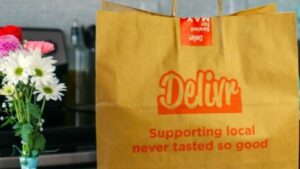They were lifesavers during lockdown – but these Aussie start-ups are now dying off one by one, leaving workers high and dry.
As Australia suffered through seemingly endless Covid lockdowns, grocery delivery start-ups suddenly exploded.
It’s no surprise these companies were such a hit, with Aussies avoiding physical stores like never before.
But these days, it’s a very different story and those delivery darlings are fast becoming a dying breed.
In March 2022, news broke that Quicko, which promised deliveries within two hours, had gone under.
Just two months later, Send — which promised to deliver groceries in under 15 minutes — had collapsed, putting 300 jobs across Sydney and Melbourne at risk.

Send was one of the first victims. Picture: Supplied
In July, Delivr — a Victorian food delivery company that styled itself as a rival to UberEats and Deliveroo — also folded, with 200 jobs lost.
Then, in November, fellow online grocery delivery start-up Voly appeared to abruptly shut down, leaving customers trying to place orders completely in the dark.
The same month, meal delivery company Deliveroo also collapsed into administration, leaving 15,000 delivery riders high and dry along with the thousands of restaurants that relied on them to deliver orders to customers.
Now, according to The Australian, Milkrun could become the latest casualty, with the publication reporting that the firm “has attempted and failed to raise fresh capital on two separate occasions in the past year”, with “pressure now mounting on the Sydney-based group to improve its financial situation”.
Founded by Young Rich Lister Dany Milham, Milkrun raised $11 million for his venture before it even launched in September 2021, and attracted a record $75 million in funding the year after.
Milham planned to expand into other retail categories beyond supermarket products, and previously claimed the company could make more than $5 billion a year.
A Milkrun spokeswoman told news.com.au claims that investors were in the process of trying to sell the business were untrue, that the company had recently changed its strategy, including in regards to delivery time, growth initiatives and cost structure, and insisted Milkrun was not cutting wages.
However, Milkrun is yet to reach profitability, and has been losing up to $13 per order, as per The Australian.

Delivr went into liquidation in July
By now, it’s clear the experiment has all but failed in Australia, with the few companies that remain facing increasingly tough conditions.
But how exactly did it all go so wrong, so fast?
According to Queensland University of Technology’s retail expert Gary Mortimer, Australia’s appetite for these services was fading fast – for several key reasons.
“These smaller entrepreneurial start-ups really exploited the pandemic when people were locked at home and told to avoid crowds, so what these operators saw at that stage was an untapped market of consumers who really wanted access to food and groceries in a fast, efficient way,” he explained.
Prof Mortimer added that when the pandemic first hit, supermarket giants Coles and Woolworths temporarily shut down online shopping as they struggled to cope with the sudden surge in demand, leaving the door wide open for delivery start-ups to muscle in and take advantage of the sudden gap.
However, now, things have well and truly changed.
“The problem is that a) the model is not scalable, and b) they are facing far too many headwinds – the major one is as the pandemic lifted, people returned to physical grocery shopping and all other kinds of shopping, and the ABS data signals that,” he said.
“In September 2021, Australians spent $4.4 billion online, and by February 2022 that dropped to $3 billion, and it sat between $3 billion and $3.5 billion every month last year.

Voly had attempted to disrupt the grocery industry, promising customers delivery in 15 minutes or less. Picture: Supplied
“So $800 million to $1 billion has shifted form online shopping back to physical retail stores, and the other challenge all these models face is limited range versus what Coles and Woolworths offer.”
Prof Mortimer said that the Australian market was also more challenging than other markets, such as New York, where wages were lower and population density much higher, making the business model more profitable.
“And the other problem they’re having now … is access to labour. [During the pandemic] people were stood down, they needed to work and were doing anything to make ends meet, but now, unemployment is at 3.5 per cent and there are 49,000 vacancies across the retail sector,” he added.
“They’re also targeting that inner city Sydney and Melbourne market, and inner city rent is incredibly expensive. So there’s increasing rent costs, wage costs and less access to available people to move stuff around for you, and then at the customers’ end, people are really sensitive to inflationary pressures.”

Milkrun is reportedly in trouble. Picture: Supplied
Prof Mortimer said as cost of living pressures mount, and the supermarket heavyweights improved their click and collect and online offering, consumers were more likely to go for the cheapest option by ordering online and picking their groceries up themselves – for free.
He also added that Woolies had moved in on the delivery action, launching Metro60 last year which offered delivery under 60 minutes for $5 via Uber drivers.
“They’re really investing heavily in online infrastructure, so launching these small entrepreneurial delivery start-ups during the pandemic was great, but clearly, as we move out of the pandemic, there are lots of … factors impacting them.”
News source found here
Theo Foukkare is available for interview on 0423 003 133
Subscribe to our free mailing list and always be the first to receive the latest news and updates.
